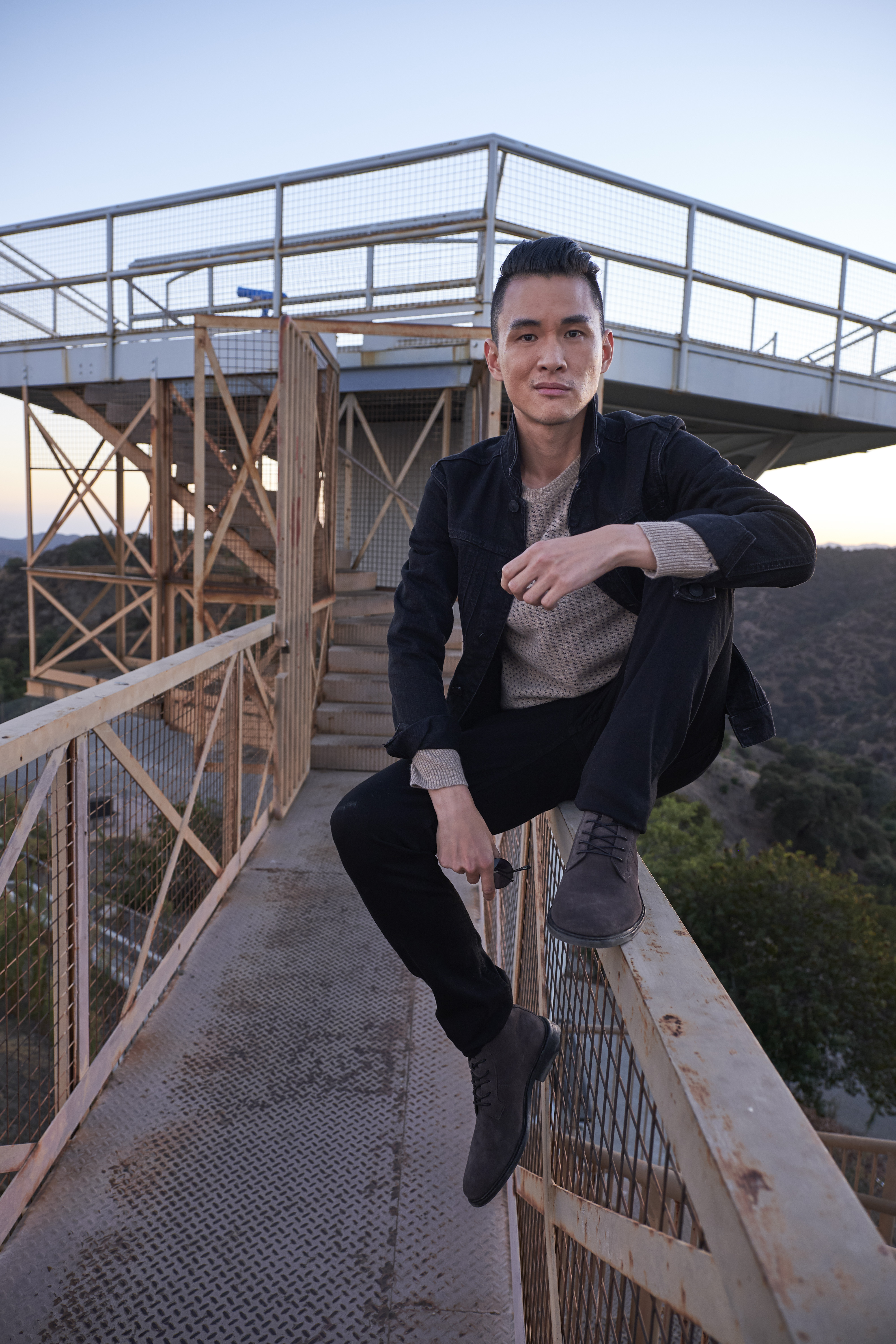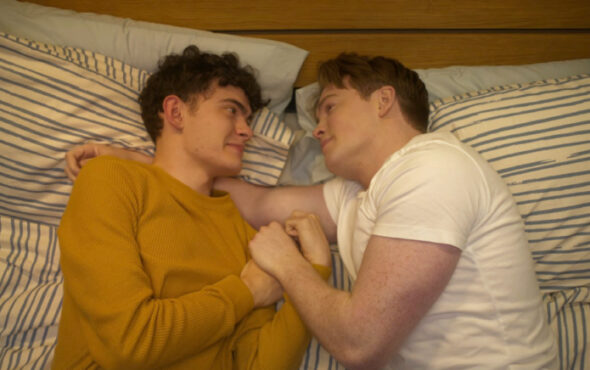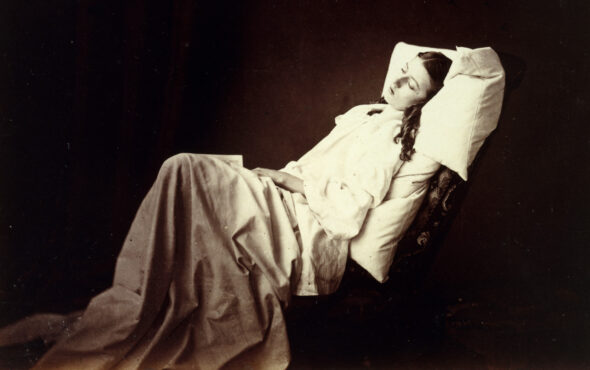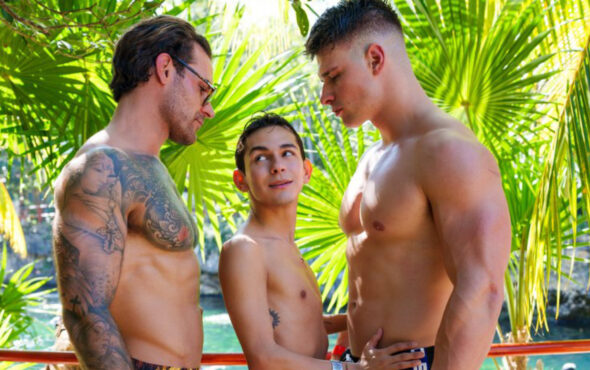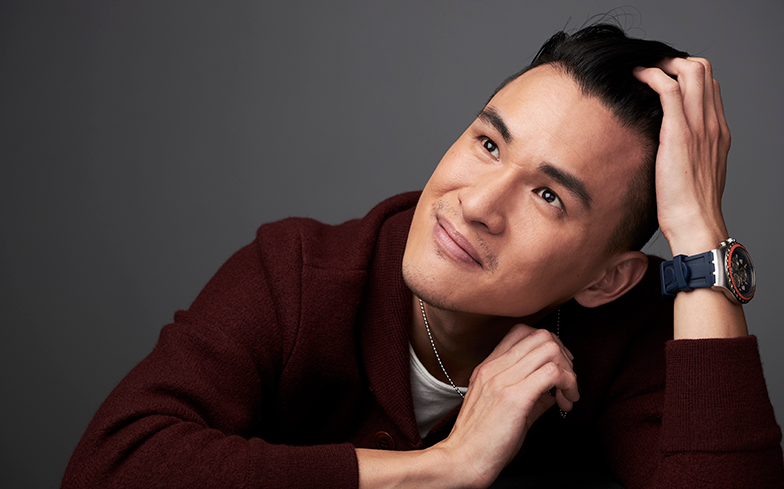
“I had no choice but to come out, if I wanted to stay an actor. In so many ways, the industry has saved my life.”
After 18 years of speculation and desperation for a sequel, American supermodel and businesswoman Tyra Banks finally starred in a follow-up to the fantasy cult classic, Life-Size – which starred Lindsay Lohan in one of her first film roles.
The comedy premiered last weekend on Freeform as part of their 25 days of Christmas, and saw the America’s Next Top Model host reprise her role as Eve, a plastic doll with some fierce lewks who transforms into a human being.
To celebrate the film’s release, we caught up with Chinese-American actor Hank Chen, who stars in the sequel as Brendan Butler, and he had nothing but kind words about working with Tyra.
“She’s an icon,” he tells us. “I got to experience first-hand the reason why, and I will say one word: kindness. She went out of her way to talk to everyone, to be kind to everyone, all while having her son on set, running her multimedia empire.”
Hank also opens up about being an openly gay Chinese-American actor in the industry, growing up in a “homophobic” home, and how he came to form One Wheaton, an LGBT advocacy group for students in evangelical Christian colleges.
The original Life-Size has become a bit of a cult classic and has a big gay following. Is this one of the reasons why you were drawn to the role?
I was drawn to the role because a, it was Tyra Banks, and b, because it was Disney. And money’s a pretty good motivation too! My very first email address was – and feel free to print this, because I haven’t checked it in years and I don’t even know if it’s still active – disneyfreaks4@juno.com. I’m not sure if anyone remembers that server. I had that all throughout high school, until my parents were like, ‘Okay, we think you need a more professional email because you need to apply for internships and school activities…’ I couldn’t be applying for jobs as disneyfreaks4@juno.com! It was right on the cusp of when people were still hiding their identities in their email address and now everybody is just first name and last name. Right? And the film has a big gay following by default, I don’t think Disney was out to make a gay movie, and I don’t think Disney has marketing test groups that are like, ‘How can we turn this film into an iconic gay film?’ I think by default, Disney films especially with this much fantasy and fashion, just end up becoming gay that’s because the type of stuff we all love as closeted little gay boys.
Oh yeah, we love a Disney film with a strong female lead.
Yeah sure! Strong female lead, also the fantasy and fabulousness of it, the safety of it. I feel like my friends who are young adults now, who are very straight and married, none of them were like, ‘Oh yeah, The Little Mermaid? Amazing!’ I think they were all forced to watch it, Disney films are iconic and they’re always playing in the background, especially if you have a sister or a female cousin. I think that straight guys aren’t ashamed to say Beauty and the Beast was awesome, but none of them are like, ‘Oh my god, Emma Watson remake? I die!’ Disney films are very comforting, and they protected us as children, I think.
What was it like working with Tyra Banks on the film?
She’s an icon. She’s a queen. She’s an icon. Working with her, I got to experience first-hand the reason why, and I will say one word: kindness. Tyra Banks is, in industry terms, number one on the call sheet, and there’s an unwritten rule that number one sets the tone for the entire set, because they are the boss. And so if number one is late or unhappy, that influences everybody else’s work. And that was never the case with Tyra. She went out of her way to talk to everyone, to be kind to everyone, all while having her son on set, running her multimedia empire. I never saw this woman sweat, and we were all wearing winter clothes in Atlanta in the summer. If she had a stressful day, I never witnessed it, and I’ve spent mant 14/16 hour days with Tyra Banks. That goes to show you. I will tell you something I really learned too, is that Tyra Banks – in addition to being kind – always took care of herself. I believe in doing that, enabled her to be so generous when she was working. She ate her meals on time, she took naps when she was able to, she played with her son when she got the opportunity to, she took the time to laugh and have fun. I believe that is why she was able to give so much to everybody else. What was your first introduction to Tyra Banks?
Funnily enough, Life-Size. It was one of my favourite films growing up.
You’re an OG fan! Amazing! That makes me so happy to hear because Lindsay Lohan is hugely popular in the UK. In fact, I believe she went over there to retreat from American life for a little while, so I knew Lindsay is beloved in Europe. Everyone loves her.
I’m gonna get a little deeper now… When you started out as an actor, did you ever question being openly gay in the industry?
Oh I struggled with it. I believe I went into acting as a way of escaping my life, and quickly learned that the only way for me to do good work was to be authentic as I could be. I had a couple of teachers when I was in New York that really helped me come out of my shell, and one of them had to pretty much hold my hand in her face and said, “Look, I know you’re gay, and that’s okay. You’re beautiful exactly as you are.” I broke down weeping, because I didn’t hear that growing up. It wasn’t until I became fully out and proud of myself that I started booking because I believed, even when I was going into audition rooms, and people can feel it. People can feel if you are being inauthentic and maybe they can’t place their finger on it, but they’re just not drawn to you. That’s what makes a good actor, you have to want to watch them, you have to wanna believe them. This is not just for gay roles. I probably wasn’t even doing gay roles authentically. I was putting on my version of what a gay guy was, but now when I audition for a job, I’m just me. I had no choice but to come out, if I wanted to stay an actor. In so many ways, the industry has saved my life, because I get to be in touch with the core of who I am on a daily basis. In fact, it’s required for my job.
As well as being gay, you’re Chinese American, an ethic minority. Has this ever hindered you as an actor?
In my love life, yes! In the industry, I think it was to my advantage. People love diversity. I know that there are a lot less opportunities for actors who are diverse. However, because the leads of so many projects are usually white, a lot of time projects are looking to fill with supporting cast members with people of colour. If it’s a gay role, I’m usually in contention, but usually next to an African-American or a Latino. In the entertainment industry, I think being a person of colour, gay or straight, is a huge advantage, so I believe that has helped. If it has hindered, if they were explicitly not looking for an Asian character to portray a character, then I don’t hear about it. There’s so much work that is done on my behalf behind-the-scenes by my amazing team, that I’m not privy to, and I’m frankly protected from. My representatives are constantly pitching me and selling me, and saying nice things about me and advocating for me, and if someone tells them to their face that they’re not looking for Hank Chen, I fortunately don’t have to hear about it.
You’ve been open about being raised in a Christian “homophobic” home. How did that impact you growing up?
I think the childhood that I had made me a much stronger adult, because compared to the rejection I had to deal with growing up, the rejection I face from Hollywood is child’s play. When you grow up in an evangelical environment that has very rigid values and beliefs about gay people, all while you’re questioning your sexuality, as a child you end up living in a world where there are no safe spaces. Ironically for me, because I was a little swishy as a child, I started to get bullied around middle school. My safe space was actually the church, because I wasn’t openly made fun of to my face or physically antagonised. They were too polite to do that. I have a very high tolerance for discomfort, which was developed for years as a child. Now, I’m learning that it’s okay to say no and to take care of myself. It’s okay to hang out with people who don’t have a problem with gay people. It seems very basic, but these are all privileges that weren’t afforded to me as a child. But you can make lemons into lemonade, and it shaped me into the person I am today.
Do you think your childhood, being raised in that kind of environment, is why you went on to do so many great things afterwards? Such as becoming a founding member of OneWheaton?
Yeah. OneWheaton is an advocacy group that spun off in direct response to my college’s position on homosexuality. I went to Wheaton college in Illinois, which is different to the one in Massachusetts, which is actually very cool with gay people. They hate being confused with the one I actually went to! When I went to that college… One of the hardest things about being raised religious is you feel isolated. You have no one to share these very confusing thoughts with, and as soon as you do, you know you’ll be targeted or get in trouble, like an abusive therapy or conversion camp – which still happens. So out of the fear of your own safety, you stay quiet. Being at Wheaton, I didn’t fear physical violence but I did fear being expelled. So OneWheaton was founded when a bunch of alumni found each other on Facebook, and we were literally all like, ‘Oh my god, you exist?’ It was like discovering a unicorn, because I felt so alone on that campus. Yes, there were a handful of people where I was like, ‘You’re feminine, or wow you’re really into Britney Spears…’ You were always afraid to ask anybody because a, like myself, they would probably deny it, and b, doing so would condemn them to some sort of disciplinary action. Or worse, hell, because we were religious. It was very ‘don’t ask, don’t tell’ on that campus. OneWheaton was formed as a resource to let current students know that a group of us exist, because I know that if it had existed when I went to that college, it would’ve meant the world to me. It has spun off with other Christian colleges, and so there’s a network now for young gay Christian teens who have no choice but to go to a Christian college for whatever reason, to know that a resource like OneWheaton will be available to them during and after they graduate.
Now that you’ve been in the Life Size sequel, are there any other similar cult classics that you’d love to see revived?
Yes, Showgirls! Elizabeth Berkley deserves another chance! Nomi Malone is not yet the box office shot that she deserves, and since become a gay icon. I believe that Elizabeth Berkley and Gina Gershon deserve their time in the limelight with a film that has brought so much campy joy and empowerment to the gay community. Whenever I’m having a bad day, I’ll pull up Elizabeth Berkley’s introduction to Showgirls at the Hollywood Forever Cemetary a couple of years ago. You can see the love and the adoration in her eyes when she was greeted to cheers. The speech she gave was so beautiful and so empowering. We need a Showgirls 2. I want to know where everybody is in Vegas. Bring them all back. Let’s give them the celebration it deserves, and give me a role! I want the headlines to read, ‘Life Size 2 actor heads to Showgirls 2’.
You can watch Life-Size 2 on Freeform now. Watch the trailer below.
Photography Benny Haddad
